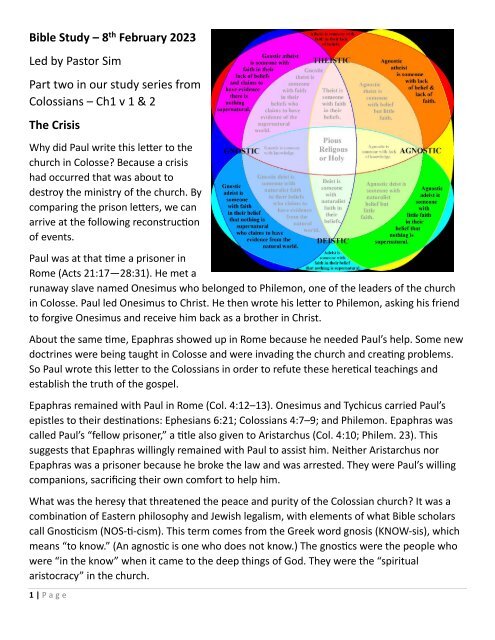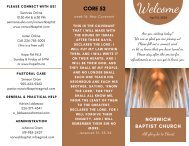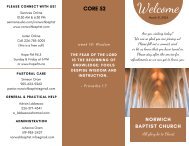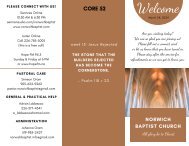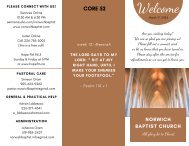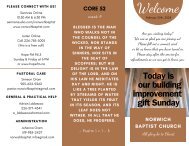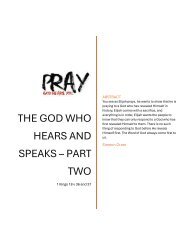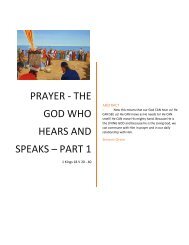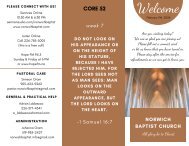Colossians the Crisis - Part 2
Notes from our Bible Study held on the 8th February 2024. Second Study in Colossians
Notes from our Bible Study held on the 8th February 2024. Second Study in Colossians
Create successful ePaper yourself
Turn your PDF publications into a flip-book with our unique Google optimized e-Paper software.
Bible Study – 8 th February 2023<br />
Led by Pastor Sim<br />
<strong>Part</strong> two in our study series from<br />
<strong>Colossians</strong> – Ch1 v 1 & 2<br />
The <strong>Crisis</strong><br />
Why did Paul write this letter to <strong>the</strong><br />
church in Colosse? Because a crisis<br />
had occurred that was about to<br />
destroy <strong>the</strong> ministry of <strong>the</strong> church. By<br />
comparing <strong>the</strong> prison letters, we can<br />
arrive at <strong>the</strong> following reconstruction<br />
of events.<br />
Paul was at that time a prisoner in<br />
Rome (Acts 21:17—28:31). He met a<br />
runaway slave named Onesimus who belonged to Philemon, one of <strong>the</strong> leaders of <strong>the</strong> church<br />
in Colosse. Paul led Onesimus to Christ. He <strong>the</strong>n wrote his letter to Philemon, asking his friend<br />
to forgive Onesimus and receive him back as a bro<strong>the</strong>r in Christ.<br />
About <strong>the</strong> same time, Epaphras showed up in Rome because he needed Paul’s help. Some new<br />
doctrines were being taught in Colosse and were invading <strong>the</strong> church and creating problems.<br />
So Paul wrote this letter to <strong>the</strong> <strong>Colossians</strong> in order to refute <strong>the</strong>se heretical teachings and<br />
establish <strong>the</strong> truth of <strong>the</strong> gospel.<br />
Epaphras remained with Paul in Rome (Col. 4:12–13). Onesimus and Tychicus carried Paul’s<br />
epistles to <strong>the</strong>ir destinations: Ephesians 6:21; <strong>Colossians</strong> 4:7–9; and Philemon. Epaphras was<br />
called Paul’s “fellow prisoner,” a title also given to Aristarchus (Col. 4:10; Philem. 23). This<br />
suggests that Epaphras willingly remained with Paul to assist him. Nei<strong>the</strong>r Aristarchus nor<br />
Epaphras was a prisoner because he broke <strong>the</strong> law and was arrested. They were Paul’s willing<br />
companions, sacrificing <strong>the</strong>ir own comfort to help him.<br />
What was <strong>the</strong> heresy that threatened <strong>the</strong> peace and purity of <strong>the</strong> Colossian church? It was a<br />
combination of Eastern philosophy and Jewish legalism, with elements of what Bible scholars<br />
call Gnosticism (NOS-ti-cism). This term comes from <strong>the</strong> Greek word gnosis (KNOW-sis), which<br />
means “to know.” (An agnostic is one who does not know.) The gnostics were <strong>the</strong> people who<br />
were “in <strong>the</strong> know” when it came to <strong>the</strong> deep things of God. They were <strong>the</strong> “spiritual<br />
aristocracy” in <strong>the</strong> church.<br />
1 | P a g e
To begin with, this heresy promised people such a close union with God that <strong>the</strong>y would<br />
achieve a “spiritual perfection.” Spiritual fullness could be <strong>the</strong>irs only if <strong>the</strong>y entered into <strong>the</strong><br />
teachings and ceremonies prescribed. There was also a “full knowledge,” a spiritual depth, that<br />
only <strong>the</strong> initiated could enjoy. This “wisdom” would release <strong>the</strong>m from earthly things and put<br />
<strong>the</strong>m in touch with heavenly things.<br />
Of course, all of this teaching was but man-made philosophy based on traditions and not on<br />
divine truth (Col. 2:8). It grew out of <strong>the</strong> philosophical question Why is <strong>the</strong>re evil in this world if<br />
creation was made by a holy God? As <strong>the</strong>se philosophers speculated and pondered, <strong>the</strong>y came<br />
to <strong>the</strong> false conclusion that matter was evil. Their next false conclusion was that a holy God<br />
could not come into contact with evil matter, so <strong>the</strong>re had to be a series of “emanations” from<br />
God to His creation. They believed in a powerful spirit world that used material things to attack<br />
mankind. They also held to a form of astrology, believing that angelic beings ruled heavenly<br />
bodies and influenced affairs on earth (see Col. 1:16; 2:10, 15).<br />
Added to <strong>the</strong>se Eastern speculations was a form of Jewish legalism. The teachers believed that<br />
<strong>the</strong> rite of circumcision was helpful in spiritual development (Col. 2:11). They taught that <strong>the</strong><br />
Old Testament law, especially <strong>the</strong> dietary laws, was also useful in attaining spiritual perfection<br />
(Col. 2:14–17). Definite rules and regulations told <strong>the</strong>m what was evil and what was good (Col.<br />
2:21).<br />
2 | P a g e<br />
Since to <strong>the</strong>m matter was evil, <strong>the</strong>y had to<br />
find some way to control <strong>the</strong>ir own human<br />
natures in this pursuit of perfection. Two<br />
different practices resulted. One school of<br />
thought held that <strong>the</strong> only way to conquer<br />
evil matter was by means of rigid discipline<br />
and asceticism (Col. 2:23). The o<strong>the</strong>r view<br />
taught that it was permissible to engage in<br />
all kinds of sin, since matter was evil<br />
anyway! It appears that <strong>the</strong> first opinion<br />
was <strong>the</strong> predominant one in Colosse.<br />
It is easy to see how this kind of teaching<br />
undermined <strong>the</strong> very foundations of <strong>the</strong> Christian faith. To begin with, <strong>the</strong>se heretics attacked<br />
<strong>the</strong> person and work of Jesus Christ. To <strong>the</strong>m, He was merely one of God’s many “emanations”<br />
and not <strong>the</strong> very Son of God come in <strong>the</strong> flesh. The Incarnation means God with us (Matt.<br />
1:23), but <strong>the</strong>se false teachers claimed that God was keeping His distance from us! When we<br />
trust <strong>the</strong> Son of God, <strong>the</strong>re is no need for intermediary beings between us and heaven!
In His work on <strong>the</strong> cross, Jesus Christ settled <strong>the</strong> sin question (Col. 1:20) and completely<br />
defeated all satanic forces (Col. 2:15). He put an end to <strong>the</strong> legal demands of <strong>the</strong> law (Col.<br />
2:14–17). In fact, Jesus Christ alone is <strong>the</strong> Preeminent One (Col. 1:18; 3:11)! All that <strong>the</strong><br />
believer needs is Jesus!<br />
Matter is not evil, and <strong>the</strong> human body is not evil. Each person is born with a fallen human<br />
nature that wants to control <strong>the</strong> body and use it for sin, but <strong>the</strong> body itself is not evil. If that<br />
were <strong>the</strong> case, Jesus Christ would never have come to earth in a human body. Nor would He<br />
have enjoyed <strong>the</strong> everyday blessings of life as He ministered on earth, such as attending<br />
wedding feasts and accepting invitations to dinner. Diets and disciplines can be good for one’s<br />
health, but <strong>the</strong>y have no power to develop true spirituality (Col. 2:20–23).<br />
As for astrology and <strong>the</strong> influence of angels and heavenly bodies, Paul denounced this with<br />
vigor. On <strong>the</strong> cross, Jesus won a complete victory over all satanic powers (Col. 2:15). Christians<br />
do not need to turn to <strong>the</strong> rudiments of <strong>the</strong> world (Col. 2:8, 20). This word translated<br />
“rudiments” means “elemental beings” or “elementary principles.” In this case, it refers to <strong>the</strong><br />
beings that (according to <strong>the</strong> gnostics) controlled <strong>the</strong> heavenly bodies that in turn controlled<br />
events on earth.<br />
Believers who consult horoscopes substitute superstition for revelation and deny <strong>the</strong> person<br />
and work of Christ.<br />
This false teaching was a deceptive combination of many things: Jewish legalism, Eastern<br />
philosophy, pagan astrology, mysticism, asceticism, and even a touch of Christianity. There was<br />
something for everybody, and this was what made it so dangerous. The false teachers claimed<br />
that <strong>the</strong>y were not denying <strong>the</strong> Christian faith, but only lifting it to a higher level. They offered<br />
fullness and freedom, a satisfying life that solved all <strong>the</strong> problems that people face.<br />
3 | P a g e<br />
Do we have any of this<br />
heresy today? Yes, we do;<br />
and it is just as deceptive<br />
and dangerous! When we<br />
make Jesus Christ and <strong>the</strong><br />
Christian revelation only<br />
part of a total religious<br />
system or philosophy, we<br />
cease to give Him <strong>the</strong><br />
preeminence. When we<br />
strive for “spiritual<br />
perfection” or “spiritual
fullness” by means of formulas, disciplines, or rituals, we go backward instead of forward.<br />
Christian believers must beware of mixing <strong>the</strong>ir Christian faith with such alluring things as yoga,<br />
transcendental meditation, Eastern mysticism, and <strong>the</strong> like. We must also beware of “deeper<br />
life” teachers who offer a system for victory and fullness that bypasses devotion to Jesus Christ.<br />
In all things, He must have <strong>the</strong> preeminence!<br />
This heresy was in direct contrast to <strong>the</strong> teaching of Paul. It took a negative view of life: “God is<br />
far away, matter is evil, and demonic forces are constantly threatening us.” The Christian faith<br />
teaches that God is near us, that God made all things good (though <strong>the</strong>y can be used for evil),<br />
and that Christ has delivered His people from <strong>the</strong> powers of darkness (Col. 1:13). This heresy<br />
turned <strong>the</strong> world into a frightful prison, while Jesus made it clear that <strong>the</strong> Fa<strong>the</strong>r is at work in<br />
this world caring for His own. Finally, <strong>the</strong>se false teachers tried to change people from <strong>the</strong><br />
outside, by means of diets and disciplines. But true spiritual growth comes from within.<br />
4 | P a g e


